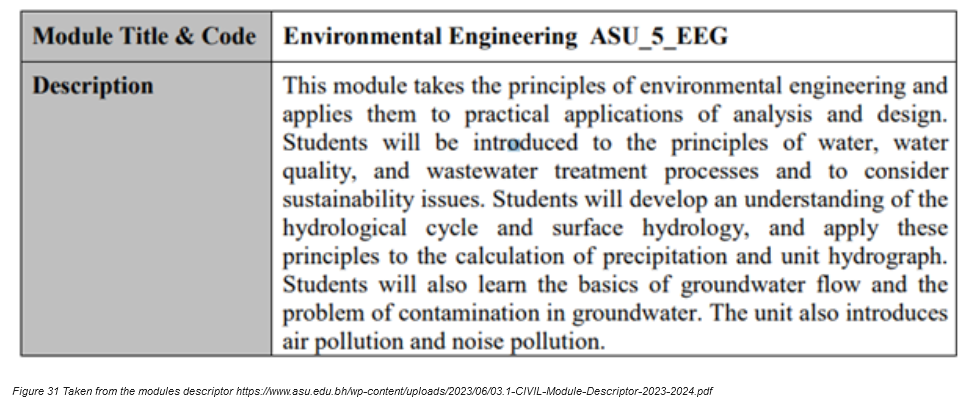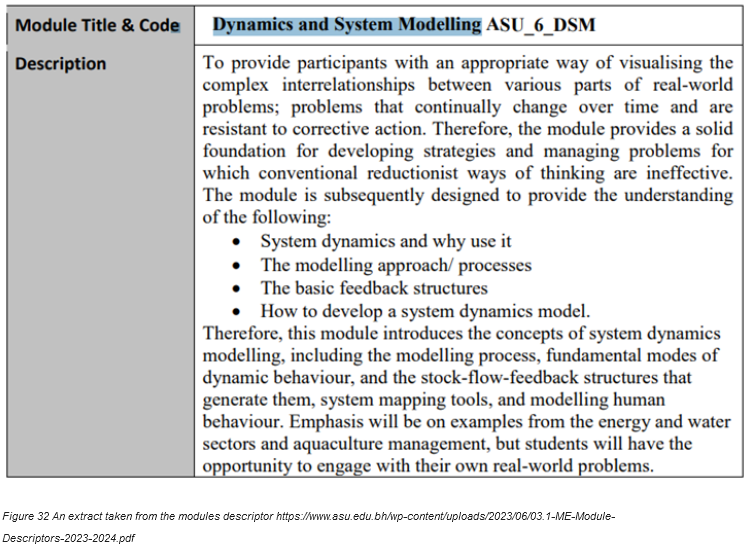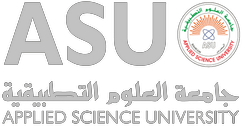Student Graduation Projects:
- Stormwater Management: Design And Flood Modelling Of Open Channels Including The Road Culvert Design, Reema Kamashki, Link
- Design Of Sewerage And Storm Water Systems For A Block In Al Hijiyyat- Bahrain, Aysha Juma Almaraisi, Link
- Towards Sustainability: The Design Of Rainwater And Greywater Harvesting Systems For Institutional Buildings, Hala Alnema, Link
- Rainwater Harvesting System In Bahrain: A Comparative Analysis, Mohamedkhalid Almahmeed, Link
- Design And Implementation Of A Sustainable Water Supply System For Al Naseem Gated Community At Diyar Al Muharraq, Sara Alhooti, Link
- Design Of A Water Supply System For A Block In Al Hijiyyat– Bahrain, Adam Faheem.
ASU Research Papers:
- Reema Kamashki and Rouya Hdeib 2024 “Towards Resilient Stormwater Management System.Application of Al-Lawzi Lake Stormwater System” 2024 International Conference In Emerging Technologies For Sustainability And Intelligent Systems (ICETSIS 2024).January 28-29, 2024 (Hybrid), Applied Science University in Bahrain, Kingdom of Bahrain
- In process to be published: Sedki, A., AlTaweel, J., Jasim, N., AlKaabi, Z., “Water Quality in Bahrain’s Coastal Areas: an experimental-based study,” 2024 IEEE International Conference on Environmental and Water Resources Engineering (ICEWRE), Manama, Bahrain, Dec. 2024
- Baqi, A; Abdeldayem, M.; Aldulaimi, S. (2024) Environmental Considerations in Vessel Scheduling for Sustainable Maritime Operations: A Decision Support Approach, 2024 ASU International Conference in Emerging Technologies for Sustainability and Intelligent Systems (ICETSIS),
- Baqi, A; Abdeldayem, M.; Aldulaimi, S.; Al-Kaabi, H. (2024) Empowering Greener Horizons: Novel Stakeholder Engagement Impact on Norway’s Solar-PV Storage Adoption, 2024 ASU International Conference in Emerging Technologies for Sustainability and Intelligent Systems (ICETSIS),
Research Paper Titled “Rainwater Harvesting Systems: An Urban Flood Risk Mitigation Measure in Arid Areas”
The research paper titled “Rainwater harvesting systems: An urban flood risk mitigation measure in arid areas” by Hdeib and Aouad explores the potential of rainwater harvesting (RWH) systems as a measure to mitigate urban flood risks in arid regions. The study specifically focuses on assessing the effectiveness of RWH systems in reducing flood depth and extent in a residential area in Bahrain.
This research project directly relates to SDG 13: Climate Action by supporting aquatic ecosystems through education and sustainable water management practices. By analyzing the potential use of RWH systems to mitigate urban flood risks, the study promotes sustainable water management strategies, which are essential for preserving aquatic ecosystems and adapting to climate change impacts.
The research project emphasizes the importance of RWH systems as a sustainable water supply solution in arid areas. By capturing and utilizing rainwater, these systems reduce the dependence on conventional water sources, such as groundwater and surface water. This approach helps to preserve freshwater resources, ensuring their availability for aquatic ecosystems and other environmental needs.
Furthermore, the study highlights the role of education in promoting the adoption of RWH systems and sustainable water practices. By assessing the effectiveness of RWH systems in reducing flood risks and enhancing the resilience of the built environment, the research provides valuable insights that can be used for educational purposes. It raises awareness among stakeholders, policymakers, and the general public about the potential benefits of implementing RWH systems in arid regions to mitigate flood risks and support sustainable water management.
Through this research project, Dr. Rouya’s work contributes to SDG 13 by promoting climate action through sustainable water management practices. By advocating for the use of RWH systems as a flood risk mitigation measure, the research supports the conservation of water resources, protection of aquatic ecosystems, and the overall resilience of urban areas in arid regions. Additionally, the educational aspect of the research project facilitates knowledge dissemination and capacity building, empowering communities to take action towards sustainable water management and climate resilience. Link to the research paper: https://www.sciencedirect.com/science/article/pii/S1674237023000534
BEng (Hons) Civil Engineering
Within the Civil Engineering programme taught at the university in collaboration with London Southbank University, there is a module titled with Environmental Engineering, below is the module descriptor:

BEng (Hons) Mechanical Engineering
Within the Mechanical Engineering programme taught at the university in collaboration with London Southbank University, there is a module titled with e Dynamics and System Modelling, below is the module descriptor:

Some courses of the Civil Engineering program are directly related to the environment and sustainability applications. (https://www.asu.edu.bh/courses/beng-hons-civil-engineering/)
Course Titles:
Environmental Engineering
Hydraulics
Soil Mechanics
Construction Engineering
Principles of Engineering Science 2
Current Topics in Civil and Construction Engineering
Some common courses of Architectural Engineering and Civil Engineering programs are directly related to the environment and sustainability applications. (https://www.asu.edu.bh/courses/beng-hons-architectural-engineering/)
Course Titles:
Engineering Science 1
Principles of Engineering
Engineering Research Methods
Innovation, Enterprise and Management
Some courses of Architectural Engineering directly related to the environment and sustainability applications. (https://www.asu.edu.bh/courses/beng-hons-architectural-engineering/)
Course Titles:
Integrated Design and Construction
Design Procedures for Architecture 1
Design Procedures for Architecture 2
Building Information Modelling
Energy Conservation in Buildings
Design Project
The content and the assessments of the foregoing courses have practical activities, experiments, and analysis of the following:
Energy saving, renewable energy sources, electricity consumption, water quality, water recycling, and construction management sustainability. The students learn and apply how to improve the quality and preserve the resources for human health and welfare, as well as the marine life.

